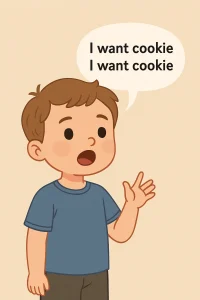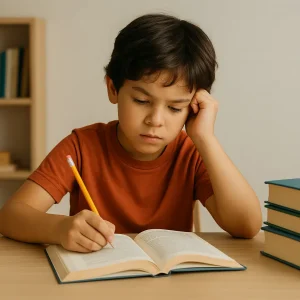Why WH Questions Matter for Kids and How to Teach Them
By Wellness Hub
Last Updated: February 3, 2025
WH questions—Who, What, When, Where, Why, and How—are more than just the basics of speech; they’re crucial for your child’s critical thinking and communication skills. Understanding how to effectively use these WH questions for kids can set the foundation for their lifelong learning and curiosity. Here, we’ll explore the importance of WH questions in child development and provide practical tips to help you teach these essential skills at home. Let’s dive into how these simple questions can make a big impact on your child’s growth.
Understanding WH Questions and Their Role in Learning
What are WH Questions?
WH questions are the building blocks of engaging and informative conversations, crucial for children’s language development. These include questions that start with ‘Who,’ ‘What,’ ‘When,’ ‘Where,’ ‘Why,’ and ‘How.’ Each of these words serves as a gateway to deeper understanding and curiosity. For example, asking “What are you eating?” helps a child describe their world, while “Why is the sky blue?” encourages them to think about and explore explanations.
How WH Questions Stimulate Cognitive Development
Engaging children with WH questions has a profound impact on their cognitive development. These questions encourage kids to think critically and articulate their thoughts, enhancing both language skills and logical thinking. By challenging them to answer and ask such questions, we stimulate their ability to form concepts, solve problems, and understand complex ideas.
Also read: WH Questions Examples for Kids: How to Teach with Fun Activities
The Benefits of WH Questions in Early Childhood Education
Enhancing Language Skills
WH questions boost children’s language development:
- Vocabulary Expansion: Asking questions like “What color is the ball?” helps children learn new words.
- Sentence Structure: Regular practice with WH questions teaches children how to form complete and coherent sentences.
Promoting Critical Thinking and Reasoning
WH questions also develop critical thinking skills:
- Analytical Thinking: Questions such as “Why do you think the plant needs water?” encourage children to think about cause and effect.
- Problem Solving: By answering WH questions, children learn to assess situations and make decisions, skills that are crucial both in school and in life.
Using WH questions regularly at home and in school prepares children for academic challenges and everyday interactions, fostering a foundation for continuous learning and problem-solving.
Teaching Strategies for WH Questions
Age-Appropriate Methods to Introduce WH Questions
Tailoring your approach to teaching WH questions can make a significant difference based on the child’s age group:
- Toddlers (1-3 years): Focus on simple, concrete questions that relate to their immediate environment, like “What is this?” while pointing to objects.
- Preschoolers (3-5 years): Introduce more complex questions that require a bit of reasoning, such as “Why do we wear a coat when it’s cold?”
- School-age children (5+ years): Challenge them with abstract questions that encourage deeper thinking and connecting concepts, like “How does rain help plants grow?”
Interactive Games and Activities
Incorporating WH questions into games and activities can make learning fun and engaging:
- Picture Storytelling: Use picture books or sequences of images and ask the child to create a story using WH questions, such as “What is happening here?” or “Why do you think she is sad?”
- Role-Playing Games: Set up scenarios where children play different roles, prompting them to ask each other questions like “Where shall we go on our adventure?” or “How will we get there?”
- Treasure Hunts: Create a treasure hunt where each clue involves answering a WH question to find the next step, making the process both educational and exciting.
Real-Life Applications of WH Questions for Kids
Everyday Conversations
Integrating WH questions into daily interactions is a straightforward and effective method to enhance your child’s communication skills. Here are some practical tips:
- Routine Activities: During mealtime or while getting dressed, ask questions like “What are you eating?” or “Why do we wear shoes?” to engage their thinking.
- Story Time: After reading a story, ask questions such as “Who was your favorite character?” or “What do you think happens next?” to develop their comprehension and predictive skills.
- Outdoor Observations: When outside, encourage curiosity with questions like “How do birds fly?” or “Why are leaves green?” This turns everyday experiences into learning opportunities.
Educational Settings
Teachers and educators can leverage WH questions to stimulate learning and participation in the classroom:
- Group Discussions: Start discussions with open-ended questions such as “What do you think about this story?” to encourage children to express their opinions and listen to others.
- Learning Stations: Set up interactive stations that pose questions requiring students to explore and find answers, like “Where does water come from?” at a science station.
- Problem-Solving Tasks: Use questions like “How can we share these toys so everyone gets one?” to teach problem-solving and fairness among peers.
Conclusion
WH questions are crucial for developing your child’s curiosity, language, and critical thinking skills. By integrating these questions into daily routines and classroom activities, we can help children grow into insightful and articulate individuals. At Wellness Hub, we provide easy-to-use resources that support this educational journey. Explore our tools and guides designed to make learning engaging and effective. Visit us at Wellness Hub to discover more and help your child or student thrive. Let’s empower our kids to question, learn, and understand the world with confidence!
Frequently Asked Questions:
1. What are WH questions?
WH questions include “Who,” “What,” “When,” “Where,” “Why,” and “How.” They are essential tools for children to learn about their environment and express themselves. These questions form the basis for engaging in meaningful conversations and gathering information.
2. Why are WH questions important for children?
WH questions foster critical thinking, significantly enhance vocabulary, and develop communication skills in children. They help children process information, understand story contexts, and articulate their thoughts and feelings effectively.
3. At what age should children start learning WH questions?
Children as young as two years old can begin learning WH questions as they start to form basic sentences and grasp simple concepts. Early exposure to these questions supports natural language development and cognitive skills.
4. How can WH questions improve my child’s language skills?
Regular use of WH questions helps children construct more complex sentences and broaden their language understanding. This practice enhances their grammar and helps them articulate detailed responses.
5. What are some simple WH questions I can ask my preschooler?
Engage your preschooler with simple WH questions like “What color is your shirt?”, “Why do we brush our teeth?”, and “Where is your favorite toy?” These questions encourage descriptive answers and daily learning.
6. How do WH questions promote critical thinking in children?
WH questions challenge children to think about cause and effect, enhancing their problem-solving and reasoning skills. They encourage children to think beyond the obvious and explore deeper explanations.
7. Can WH questions help my child in school?
Yes, mastering WH questions can boost a child’s academic performance by improving their ability to follow classroom discussions, enhance reading comprehension, and engage more deeply with learning materials.
8. What are some fun activities to teach WH questions?
Engage children with fun activities like storytelling where they answer questions about the plot, treasure hunts that require solving WH questions for clues, and role-playing games that involve scenario-based questioning.
9. How often should I practice WH questions with my child?
Integrating WH questions into daily interactions is the best approach, as it provides continuous practice and seamlessly improves both language and cognitive skills, making learning a natural part of everyday life.
10. Where can I find resources to help teach WH questions to my child?
Visit Wellness Hub for a range of educational tools and guides specifically designed to simplify the teaching and learning of WH questions. These resources offer practical advice and activities tailored to enhance children’s developmental progress.
About the Author:
Rajini Darugupally
M.Sc., Speech-Language Pathologist (9+ years of experience)
Rajini is a passionate and dedicated Speech-Language Pathologist with over 9+ years of experience, specializing in both developmental speech and language disorders in children and rehabilitation in adults. Driven by a desire to empower each individual to find their voice, Rajini brings a wealth of experience and a warm, genuine approach to therapy. Currently, at Wellness Hub, she thrives in a team environment that values innovation, compassion, and achieving results for their clients.
Book your Free Consultation Today
Parent/Caregiver Info:
Client’s Details:
* Error Message








